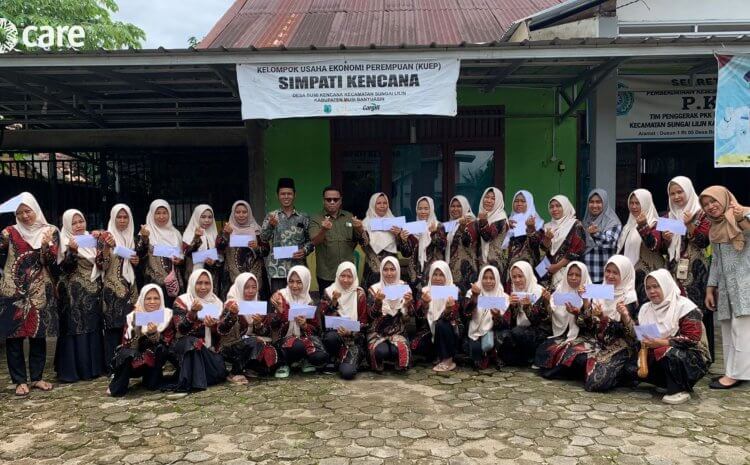Full excitement was felt on this 3rd day of Ramadhan 2024 (14/3) as my self and Winarni, member of the Women’s Economic Enterprise Group (KUEP) Simpati Kencana from Bumi Kencana Village were poised to embark on the harvest of straw mushrooms. KUEP Simpati Kencana stands as one of the 13 women’s business groups mentored by the Yayasan CARE Peduli (YCP) in the Women’s Resilience Building Program within the Oil Palm Community of Musi Banyuasin Regency, South Sumatra.
The chill in the air on the East Sumatra highway at 06:30 AM didn’t dampen my spirits that morning as I headed to meet Winarni. The 43-year-old mother of two had been eagerly awaiting my arrival at the mushroom cultivation shed behind her house. Greetings were exchanged and we stepped into the warm environment of the mushroom shed, where the temperature was carefully maintained at around 30 degrees Celsius. This morning marked the schedule for harvesting straw mushrooms cultivated from empty oil palm fruit bunches which involved several stages to process.
Since entering the production phase, the straw mushrooms have been ready for harvesting. Between March 7th and March 18th, 2024, this cultivation yielded 96.2 kg, sold at a price of Rp. 25,000 per kg. For Winarni, who is relatively new to straw mushroom cultivation, this was a commendable result and serves as a valuable learning experience for both fellow KUEP members and myself, as the field officer.
The cultivation of straw mushrooms originated from our discussions and observations with the business group members. Considering the community’s preference for consuming oyster mushrooms, which naturally grow around oil palm plantations, and the opportunity to repurpose empty palm fruit bunches as waste, this mushroom cultivation initiative implements cultivation stages to maintain the mushroom’s taste.
“The scent of wild mushrooms growing in the garden is somewhat earthy due to natural decomposition and composting. It has a distinct taste compared to cultivated mushrooms,” Winarni remarked while picking the mushrooms.
Winarni shared the process of cultivating mushrooms in empty oil palm fruit bunches, which involves several steps. Initially, the bunches are soaked for six days, followed by a six-day fermentation period where they are stacked and sprinkled with rice bran and dolomite lime. Subsequently, the bunches are tightly covered with a tarp and watered every two days. Additionally, the fermented bunches need to be flipped to prevent ammonia growth. On the 12th day after soaking and fermentation, the bunches are arranged on racks inside the shed for pasteurization or steaming. Pasteurization lasts for 4 hours at a constant temperature of 60 degrees Celsius. This steaming process ensures that the cultivated mushrooms remain odour-free and grow with vibrant colours.
“Through cultivation, we no longer need to spend time searching for wild straw mushrooms in the plantation areas. We also don’t have to wait for the rainy season to enjoy their deliciousness,” she expressed.
The straw mushroom business started with capital loans provided by KUEP SIMPATI KENCANA to its members. Winarni formed a small group to collaborate with KUEP, agreeing on deadlines and interest rates. The loans must be repaid according to the terms outlined in the Straw Mushroom Cultivation Business Agreement. Currently, the straw mushroom cultivation business is carried out by three individuals: Winarni, Neni Lestari, and Putri Indah Lestari. In the fourth month after mushroom production, the capital loan will be utilized by Neni, followed by Putri. Subsequently, the funds will be returned to KUEP Simpati Kencana to be used by other members to develop existing business potentials and opportunities.
Not just local women, men in Bumi Kencana Village also participate in building the straw mushroom shed. The construction is done by themselves, taking turns after completing their primary jobs. This approach helps reduce the expenses for daily construction workers. Involving men is essential in all programs conducted by YCP. The aim for their involvement is to promote gender equality in household and serve as a role model for the surrounding community. This principle also encourages community participation in actively contributing to societal development efforts.
As the sun climbs higher, Winarni’s bucket is now filled with ready-to-process straw mushrooms. Tomorrow, Winarni will return and check on the results of her straw mushroom cultivation. I am optimistic that this straw mushroom cultivation will yield positive results. The hope is that in the future, not only KUEP members but also the surrounding community will experience not only positive but also sustainable benefits through collective efforts by, for, and of the community itself.
Writer: Nuraisyah Pohan
Editor: Swiny Adestika
Photo Source: Nuraisyah Pohan



